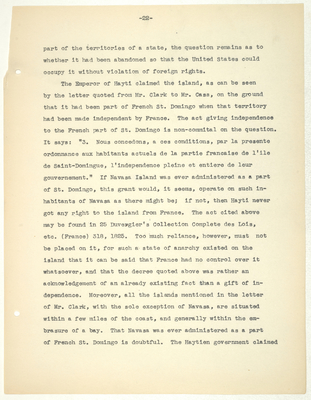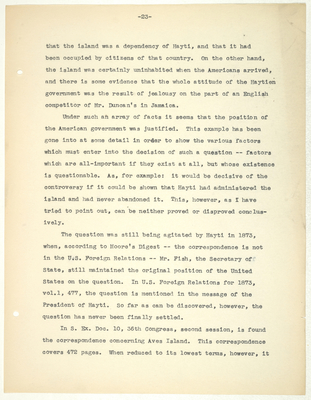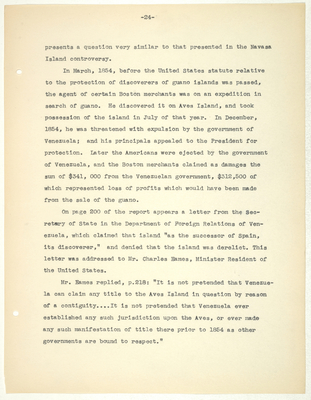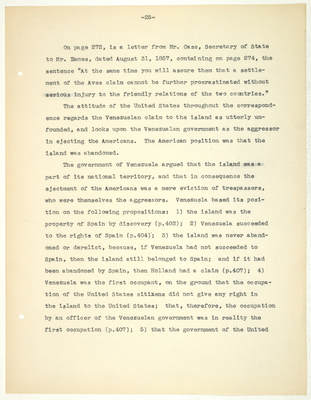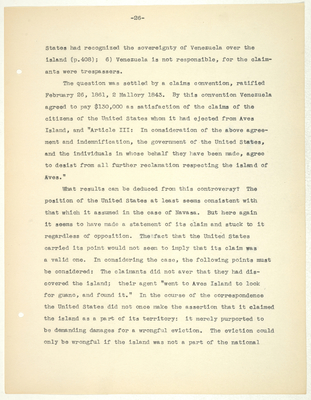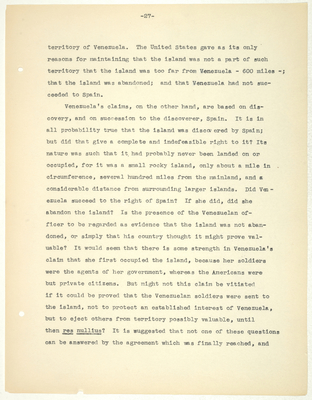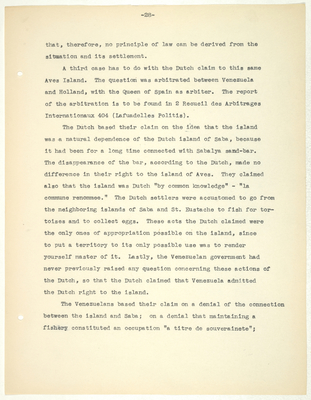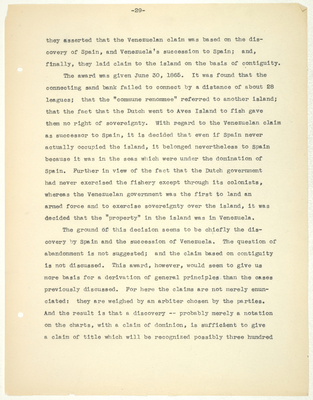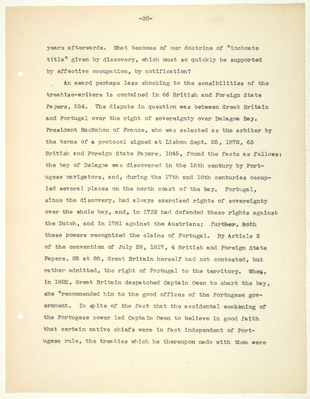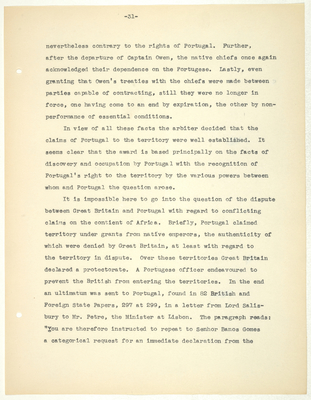Pages That Need Review
stefansson-wrangel-09-37
stefansson-wrangel-09-37-023
-22-
part of the territories of a state, the question remains as to whether it had been abandoned so that the United States could occupy it without violation of foreign rights.
The Emperor of Hayti claimed the island, as can be seen by the letter quoted from Mr. Clark to Mr. Cass, on the ground that it had been part of French St. Domingo when that territory had been made independent by France. The act giving independence to the French part of St. Domingo is non-coramital on the question. It says: ”3. Nous concedons, a ces conditions, par la presente ordonnance aux habitants actuels de la partie francaise de l'ile de Saint-Doraingue, 1’independence pleine et entiere de leur gouvernement. ” If Navasa Island was ever administered as a part of St. Domingo, this grant would, it seems, operate on such inhabitants of Navasa as there might be; if not, then Hayti never got any right to the island from France. The act cited above may be found in 25 Duvergier's Collection Complete des Lois, etc. (France) 318, 1825. Too much reliance, however, must not be placed on it, for such a state of anarchy existed on the island that it can be said that France had no control over it whatsoever, and that the decree quoted above was rather an acknowledgement of an already existing fact than a gift of independence. Moreover, all the islands mentioned In the letter of Mr. Clark, with the sole exception of Navasa, are situated within a few miles of the coast, and generally within the embrasure of a bay. That Navasa was ever administered as a part of French St. Domingo is doubtful. The Haytien government claimed
stefansson-wrangel-09-37-024
-23-
that the island was a dependency of Hayti, and that it had been occupied by citizens of that country. On the other hand, the island was certainly uninhabited when the Americans arrived, and there is some evidence that the whole attitude of the Haytien government was the result of jealousy on the part of an English competitor of Mr. Duncan’s in Jamaica.
Under such ah array of facts it seems that the position of the American government was justified. This example has been gone into at some detail in order to show the various factors which must enter into the decision of such a question -- factors which are all-important if they exist at all, but whose existence is questionable. As, for example: it would be decisive of the controversy if it could be shown that Hayti had administered the island and had never abandoned it. This, however, as I have tried to point out, can be neither proved or disproved conclusively.
The question was still being agitated by Hayti in 1873, when, according to Moore’s Digest -- the correspondence is not in the U.S. Foreign Relations -- Mr. Fish, the Secretary of' State, still maintained the original position of the United States on the question. In U.S. Foreign Relations for 1873, vol.l, 477, the question is mentioned in the message of the President of Hayti. So far as can be discovered, however, the question has never been finally settled.
In S. Ex. Doc. 10, 36th Congress, second session, is found the correspondence concerning Aves Island. This correspondence covers 472 pages. When reduced to its lowest terms, however, it
stefansson-wrangel-09-37-025
-24-
presents a question very similar to that presented in the Navasa Island controversy.
In March, 1854, before the United States statute relative to the protection of discoverers of guano islands was passed, the agent of certain Boston merchants was on an expedition in search of guano. He discovered it on Aves Island, and took possession of the island in July of that year. In December, 1854, he was threatened with expulsion by the government of Venezuela; and his principals appealed to the President for protection. Later the Americans were ejected by the government of Venezuela, and the Boston merchants claimed as damages the sum of $341, 000 from the Venezuelan government, $312,500 of which represented loss of profits which would have been made from the sale of the guano.
On page 200 of the report appears a letter from the Secretary of State in the Department of Foreign Relations of Venezuela, which claimed that island "as the successor of Spain, its discoverer,” and denied that the island was derelict. This letter was addressed to Mr. Charles Barnes, Minister Resident of the United States.
Mr. Barnes replied, p.218: "it is not pretended that Venezuela can claim any title to the Aves Island in question by reason of a contiguity....It is not pretended that Venezuela ever established any such jurisdiction upon the Aves, or ever made any such manifestation of title there prior to 1854 as other governments are bound to respect."
stefansson-wrangel-09-37-026
-25-
On page 272, Is a letter from Mr. Cass, Secretary of State to Mr. Eames, dated , containing on page 274, the sentence "At the same time you will assure them that a settlement of the Aves claim cannot be further procrastinated without serious injury to the friendly relations of the two countries."
The attitude of the United States throughout the correspondence regards the Venezuelan claim to the island as utterly unfounded , and looks upon the Venezualan government as the aggressor in ejecting the Americans. The American position was that the island was abandoned.
The government of Venezuela argued that the island was a part of its national territory, and that in consequence the ejectment of the Americans was a mere eviction of trespassers, who were themselves the aggressors. Venezuela based its position on the following propositions: 1) the island was the property of Spain by discovery (p.402); 2) Venezuela succeeded to the rights of Spain ([p.404); 3) the island was never abandoned or derelict, because, if Venezuela had not succeeded to Spain, then the Island still belonged to Spain; and if it had been abandoned by Spain, then Holland had a claim (p.407); 4) Venezuela was the first occupant, on the ground that the occupation of the United States citizens did not give any right in the island to the United States; that, therefore, the occupation by an officer of the Venezuelan government was in reality the first occupation (p.407); 5) that the government of the United
stefansson-wrangel-09-37-027
-26-
Statea had recognized the sovereignty of Venezuela over the island (p.408); 6) Venezuela is not responsible,for the claimants were trespassers.
The question was settled by a claims convention, ratified , 2 Mallory 1843. By this convention Venezuela agreed to pay $130,000 as satisfaction of the claims of the citizens of the United States whom it had ejected from Aves Island, and "Article III: In consideration of the above agreement and indemnification, the government of the United States, and the individuals in whose behalf they have been made, agree to desist from all further reclamation respecting the island of Aves.”
What results can be deduced from this controversy? The position of the United States at least seems consistent with that which It assumed in the case of Navasa. But here again it seems to have made a statement of its claim and stuck to it regardless of opposition. The fact that the United States carried Its point would not seem to Imply that its claim was a valid one. In considering the case, the following points must be considered: The claimants did not aver that they had discovered the island; their agent "went to Aves Island to look for guano, and found it.” In the course of the correspondence the United States did not once make the assertion that it claimed the island as a part of its territory: it merely purported to be demanding damages for a wrongful eviction. The eviction could only be wrongful if the island was not a part of the national
stefansson-wrangel-09-37-028
-27-
territory of Venezuela. The United States gave as its only reasons for maintaining that the island was not a part of such territory that the island was too far from Venezuela - 600 miles -; that the island was abandoned; and that Venezuela had not succeeded to Spain.
Venezuela’s claims, on the other hand, are based on discovery, and on succession to the discoverer, Spain. It is in all probability true that the island was discovered by Spain; but did that give a complete and indefeasible right to it? Its nature was such that it had probably never been landed on or occupied, for it was a small rocky island, only about a mile in circumference, several hundred miles from the mainland, and a considerable distance from surrounding larger islands. Did Venezuela succeed to the right of Spain? If she did, did she abandon the island? Is the presence of the Venezuelan officer to be regarded as evidence that the island was not abandoned, or simply that his country thought it might prove valuable? It would seem that there is some strength in Venezuela’s claim that she first occupied the island, because her soldiers were the agents of her government, whereas the Americans were but private citizens. But might not this claim be vitiated if it could be proved that the Venezuelan soldiers were sent to the island, not to protect an established interest of Venezuela, but to eject others from territory possibly valuable, until then res nulllus? It is suggested that not one of these questions can be answered by the agreement which was finally reached, and
stefansson-wrangel-09-37-029
-28-
that, therefore, no principle of law can be derived from the situation and its settlement.
A third case has to do with the Dutch claim to this same Aves Island. The question was arbitrated between Venezuela and Holland, with the Queen of Spain as arbiter. The report of the arbitration is to be found in 2 Recueil des Arbitrages Internationaux 404 (Lafuadelles Politis).
The Dutch based their claim on the idea that the island was a natural dependence of the Dutch island of Saba, because it had been for a long time connected with Sabalya sand-bar. The disappearance of the bar, according to the Dutch, made no difference in their right to the sland of Aves. They claimed also that the island was Dutch "by common knowledge” - "la commune renomraee.” The Dutch settlers were accustomed to go from the neighboring islands of Saba and St. Eustache to fish for tortoises and to collect eggs. These acts the Dutch claimed were the only ones of appropriation possible on the island, since to put a territory to its only possible use was to render yourself master of it. Lastly, the Venezuelan government had never previously raised any question concerning these actions of the Dutch, so that the Dutch claimed that Venezuela admitted the Dutch right to the island.
The Venezuelans based their claim on a denial of the connection between the island and Saba; on a denial that maintaining a fishery constituted an occupation "a titre de souverainete”;
stefansson-wrangel-09-37-030
-29-
they asserted that the Venezuelan claim was based on the discovery of Spain, and Venezuela's succession to Spain; and, finally, they laid claim to the island on the basis of contiguity.
The award was given . It was found that the connecting sand bank failed to connect by a distance of about 28 leagues; that the "commune renomraee" referred to another island; that the fact that the Dutch went to Aves Island to fish gave them no right of sovereignty. With regard to the Venezuelan claim as successor to Spain, it is decided that even if Spain never actually occupied the island], it belonged nevertheless to Spain because it was in the seas which were under the domination of Spain. Further in view of the fact that the Dutch government had never exercised the fishery except through its colonists, whereas the Venezuelan government was the first to land an armed force and to exercise sovereignty over the island, it was decided that the ‘'property” in the island was in Venezuela.
The ground of this decision seems to be chiefly the discovery by Spain and the succession of Venezuela. The question of abandonment is not suggested; and the claim based on contiguity is not discussed. This award, however, would seem to give us more basis for a derivation of general principles than the cases previously discussed. For here the claims are not merely enunciated: they are weighed by an arbiter chosen by the parties. And the result is that a discovery -- probably merely a notation on the charts, with a claim of dominion, is sufficient to give a claim of title which will be recognized possibly three hundred
stefansson-wrangel-09-37-031
-30-
years afterwards. What becomes of our doctrine of "inchoate title” given by discovery, which must so quickly be supported by effective occupation, by notification?
An award perhaps less shocking to the sensibilities of the treatise-writers is contained in 66 British and Foreign State Papers, 554. The dispute in question was between Great Britain and Portugal over the right of sovereignty over Delagoa Bay. President MacMahon of France, who was selected as the arbiter by the terms of a protocol signed at Lisbon , 63 British and Foreign State Papers, 1045, found the facts as follows? the bay of Delagoa was discovered in the 16th century by Portugese navigators, and, during the 17th and 18th centuries occupied several places on the north coast of the bay. Portugal, since the discovery, had always exercised rights of sovereignty over the whole bay, and, in 1732 had defended these rights against the Dutch, and in 1781 against the Austrians; further, both these powers recognized the claims of Portugal. By Article 2 of the convention of , 4 British and Foreign State Papers, 85 at 88, Great Britain herself had not contested, but rather admitted, the right of Portugal to the territory. When, in 1822, Great Britain despatched Captain Owen to chart the bay, she "recommended him to the good offices of the Portugese government. In spite of the fact that the accidental weakening of the Portugese power led Captain Owen to believe in good faith that certain native chiefs were in fact independent of Portugese rule, the treaties which he thereupon made with them were
stefansson-wrangel-09-37-032
-31-
nevertheless contrary to the rights of Portugal. Further, after the departure of Captain Owen, the native chiefs once again acknowledged their dependence on the Portugese. Lastly, even granting that Owen’s treaties with the chiefs were made between parties capable of contracting, still they were no longer in force, one having come to an end by expiration, the other by nonperformance of essential conditions.
In view of all these facts the arbiter decided that the claims of Portugal to the territory were well established. It seems clear that the award is based principally on the facts of discovery and occupation by Portugal with the recognition of Portugal' s right to the territory by the various powers between whom and Portugal the question arose.
It is impossible here to go into the question of the dispute between Great Britain and Portugal with regard to conflicting claims on the contient of Africa. Briefly, Portugal claimed territory under grants from native emperors, the authenticity of which were denied by Great Britain, at least with regard to the territory in dispute. Over these territories Great Britain declared a protectorate. A Portugese officer endeavoured to prevent the British from entering the territories. In the end an ultimatum was sent to Portugal, found in 82 British and Foreign State Papers, 297 at 299, in a letter from Lord Salisbury to Mr. Petre, the Minister at Lisbon. The paragraph reads: "You are therefore instructed to repeat to Senhor Banos Gomes a categorical request for an Immediate declaration from the
